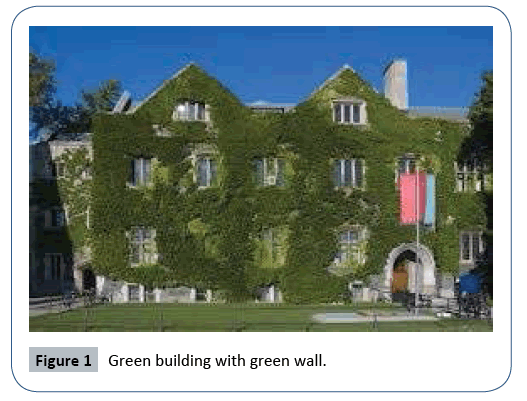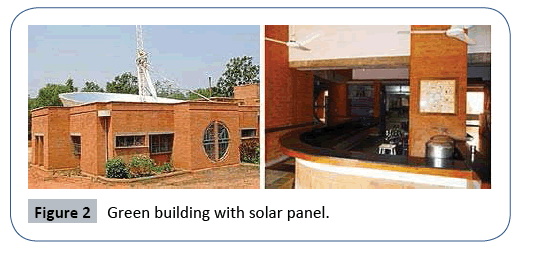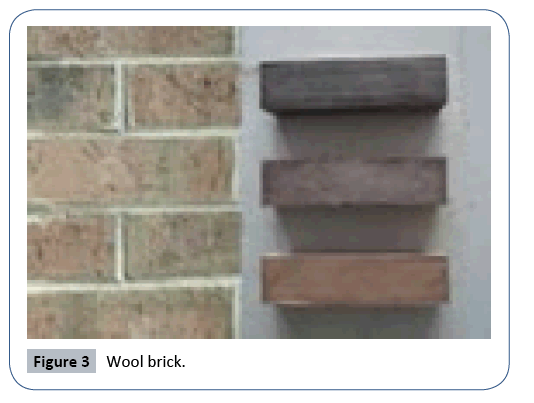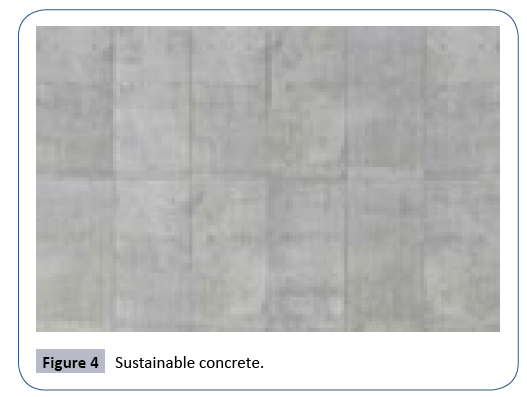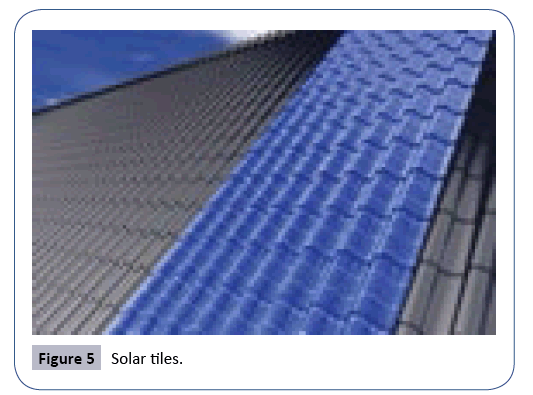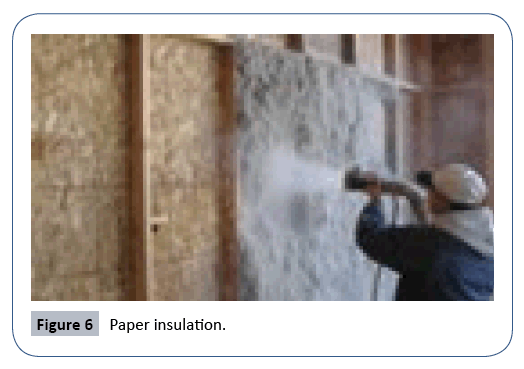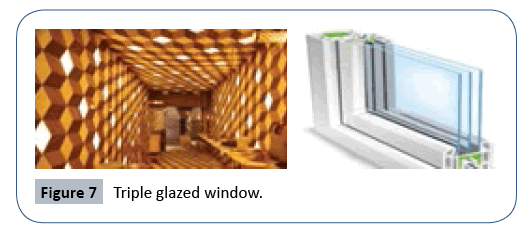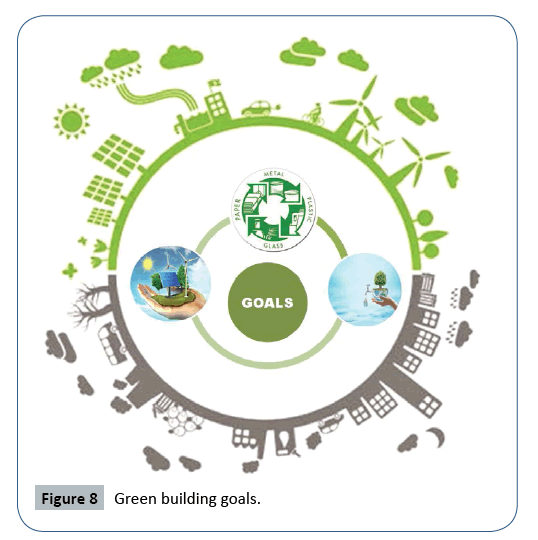Green Buildings - A Step towards Environmental Protection
Akshey B1*, Swati B2 and Disha B3
1Department of Civil Engineering, Global Institute of Engineering and Technology, Hyderabad, India
2Department of Sustainable Environmental Design, AA School of Architecture, London, UK
3Department of Urban and Regional Planning, Parul Institute of Planning, Gujarat, India
- *Corresponding Author:
- Akshey B
Department of Civil Engineering
Global Institute of Engineering and Technology
Hyderabad, India
Tel: 7727865215
E-mail: draksheyb@gmail.com
Received Date: May 15, 2018; Accepted Date: May 22, 2018; Published Date: May 29, 2018
Citation: Akshey B, Swati B, Disha B (2018) Green Buildings - A Step towards Environmental Protection. J Waste Recycl Vol.3 No.1:7
Abstract
The green building can be named economical building which deals with ecological issues within or outside the building premises. These natural issues incorporate vitality effectiveness ventures to spare vitality, water protection and decrease in water utilization, indoor air quality, building air ventilation and light, diminishment of contaminations, better wellbeing, reduction in heat island and albedo impacts impacts. The urban communities confronting natural issues have begun receiving green building ideas as a stage towards environmental protection. The authors of the present paper have briefly dealt the significance of green buildings structures alongside the expected steps to be taken in creating green structures and the subsequent advantages there from.
Keywords
Green buildings; Sustainable buildings; Energy saving; Environment
Introduction
Urbanization is growing on a faster pace throughout the world resulting into multifarious environmental problems of serious nature. These problems include air pollution, heat island, adverse health effects, water and noise pollution, waste disposal, social and economic. Usually the urban centre’s and their growth are non-sustainable on account of lack of policy issues, vested interests and ignoring sustainable parameters along with lack of public awareness and transparent decisions. Environmental policy parameters in the form of heat island effects, albedo effect, ventilation coefficients, optimization between concreting to nonconcreting urban surface and vertical to horizontal expansion, aero-dynamic effects, atmospheric stability, construction of green buildings, scientifically identified green space and so on so forth are either not being considered or not involved for want of technological solutions and compatible models. To address a portion of the ecological issues, presentation of green building idea in major urban area' is a stage towards environmental protection. Green structures are by and large sustainable structures which provide better environment and restrict negative effects [1]. Moreover, green buildings provide a sense of belongings to nature, save energy consumption by providing cooling effect, reduce heat island effect and provide better environmental conditions.
Green building concept is a part of green urban infrastructure. Green infrastructure is classified to be an approach towards land use to address important issues being faced in terms of social, environmental and economic. It is a strategically planned and designed network of natural and semi-natural areas coupled with other environmental features with a view to provide ideal ecosystem with in an urban area. Green infrastructure usually consist of parks, gardens, grassy verges, green walls or green roofs, green buildings, tree plantation along roads and development of tree belt at ideal locations. Besides these green urban elements, blue urban elements are equally considered in case of aquatic ecosystems available in urban area.
Green urban area infrastructure leads to multi dimensional and functional benefits in terms of ideal ecosystems and healthy environment along with providing wide range of environmental, social, climate change adaptation and mitigation, and biodiversity benefits. Some of th benefits are listed hereunder:
• Improved human physical, psychological and social health and wellbeing
• Enhanced livability through improving amenity and air quality, and noise abatement
• Reduction of the urban heat island effect through shading and transpiration, and providing protection from extreme weather events such as heat waves and storms
• Better water management, through reduced storm water runoff and flooding, increased soil infiltration and groundwater recharge and improved water quality
• Healthy urban ecology-conserving, creating and linking, habitat for flora and fauna
• Local food production e.g. private, school kitchen, verge and community gardens and urban orchards and farms
• Broader economic benefits from enhanced commerce and property values, health care and energy savings, and ecosystem services.
Conceptual Green Building
Green building may be conceptually defined as the tool of increasing efficiency of buildings resources in the form of energy, water and materials while reducing building impacts on human health and the environment.
The Green Building idea is picking up significance in different nations, including India. These are structures which govern waste reduction, low cost, less energy consumption, cooling effect and environmental compatibility. Moreover, green building encourages saving in water consumption, recycling, waste minimization, social and economic benefits. The U.S. EPA define "Green building is the act of making structures and utilizing forms that are naturally dependable and asset effective all through a building's life-cycle from siting to plan, development, activity, support, remodel and deconstruction”[2]. A typical green building is shown in Figure 1 below.
Benefits of Green Building
The innovative and advance technologies with new approaches tend to supplement current practices in making greener structures, the advantages of which can extend from natural to financial and to social. By embracing greener practices, we can take most extreme preferred standpoint of ecological and monetary execution. Green development techniques when effectively coordinated and implemented at planning and development stage produce extensive benefits. The green buildings may have multidimensional benefits either directly or indirectly, some of which are reflected here under [3]:
• Efficient technologies,
• Easier maintenance,
• Return on investment,
• Improved indoor air quality,
• Energy efficiency,
• Water efficiency,
• Reducing waste, contamination and environmental pollution,
• Efficiently utilizing resources, water and different assets,
• Protecting inhabitant wellbeing and enhancing efficiency,
• Waste reduction,
• Temperature moderation,
• Water conservation,
• Economical construction for poor,
• Healthier lifestyles and recreation,
• Improved health.
Another typical green building is shown in Figure 2 below.
Demerits of Green Building
Though there are significant benefits of green building yet some disadvantages also observed which are listed as under:
• Initial cost is high.
• Lack of availability of materials.
• Need of more time to construct.
• Need skilled worker.
Materials Used in Green Constructions
It would be desirable to use material for construction which are eco friendly and environmentally compatible in as much as those renewable sources are used along with materials from recycled and reuse of waste like the waste from old plumbing, doors etc. Moreover, following materials may be used for constructing green building specifying their merits [4].
Wool brick (Figure 3)
• Obtained by adding wool and a natural polymer found in seaweed to the clay of the brick.
• 37% More strength than burnt bricks.
• Resistant for cold and wet climate.
Sustainable concrete (Figure 4)
• Crushed glass.
• Wood chips or slag-a byproduct of steel manufacturing.
• Reduces the emission of CO2.
Solar tiles (Figure 5)
• Exist to simply protect a building.
• They spend a large portion of the day absorbing energy from the sun.
Paper insulation (Figure 6)
• Made from recycled newspapers and cardboard.
• Then filled with chemical foam.
• Insect resistant and fire retardant.
Triple-glazed windows (Figure 7)
• Super-efficient windows.
• Stops heat to enter the building and from direct sunlight.
• Using bamboo replacing the steel bars.
The Goals of Green Building
Presently, we ought to think about the objectives of green building. Obviously, one of the primary objectives is to make the earth more supportable, yet it truly goes further than that. When you choose to practice environmental awareness, your objective will be to really support the earth without disturbing the common natural surroundings around it. When you begin a building task, and you upset the common natural surroundings around it, you can really have an effect in the untamed life and condition that will be much similar to a butterfly impact. Indeed, even the littlest changes that you can make will advance a superior planet earth, and a superior place for every one of us to live us people, as well as the plants and untamed life that take up their habitation here on earth too.
As should be obvious, green building is something that everybody should hope In the event that you don't plan to reconstruct your home, at that point you may simply need to roll out a couple of green improvements inside your home to guarantee that you can receive the objectives that you need in return. In order to evolve and develop goals for green building, one has to identify parameters responsible for green building and equally the required inputs resulting into protection of environment. In the present context, following goals are required to be adequately addressed [4]:
• Energy efficiency and renewable energy.
• Water efficiency.
• Environmentally preferable building materials and specifications.
• Waste reduction.
• Toxic reduction.
• Indoor air quality.
• Smart growth and sustainable development.
• Reduction of heat island effect.
The diagram indicating goals is shown in Figure 8.
Conclusion
Green buildings are becoming popular world over including in India partly because of its being eco friendly and environmentally compatible and partly because it saves energy, water, restrict environmental pollution and provide natural comfort. However, significant research needs to be undertaken in terms of finding eco friendly construction materials, designed planning, energy and water saving techniques, construction of cool or green roofs, cool pavements, and so on so forth. Government and policy makers should make mandatory provisions under their legislative framework to develop green buildings in the urban planning process.
References
- https://greenbuildingsolutions.org/green-building-materials/roofing/.
- https://pmsilicone.com/sustainable-roofing-materials/.
- https://www.smartcitiesdive.com/ex/sustainablecitiescollective/eight-eco-friendly-roofing-materials-when-building-roof/1213354/.
- https://www.bamboogrove.com/general-uses-for-bamboo.html.

Open Access Journals
- Aquaculture & Veterinary Science
- Chemistry & Chemical Sciences
- Clinical Sciences
- Engineering
- General Science
- Genetics & Molecular Biology
- Health Care & Nursing
- Immunology & Microbiology
- Materials Science
- Mathematics & Physics
- Medical Sciences
- Neurology & Psychiatry
- Oncology & Cancer Science
- Pharmaceutical Sciences
